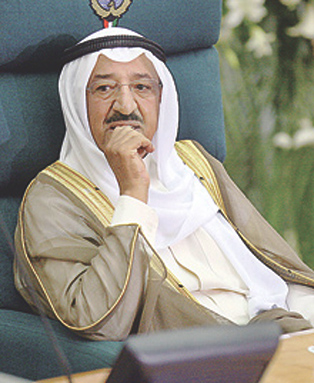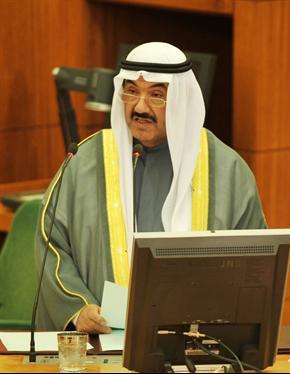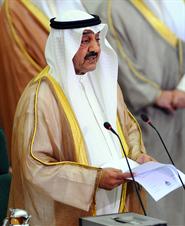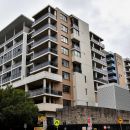| Middle East |
| Kuwait’s Amir Sheikh Sabah warned against undermining national unity |
 |
HH the Amir Sheikh Sabah Al-Ahmad Al-Sabah last month inaugurated the new term of the National Assembly by calling for necessary actions, including legislation, to avert repercussions of the global financial crisis on the national economy. The Amir also called for speeding up economic plans, especially mega projects, insisting that it was no longer acceptable to delay such projects, and warned that financial surpluses could be temporary and deceptive. Sheikh Sabah called for closer cooperation between the government and the Assembly but recalled that the appointment of the prime minister and ministers was "my sole authority and I will not let anyone intervene in it". He called for rallying all efforts to ward off the fallout of the global financial crisis on the Kuwaiti economy. "The Kuwaiti economy is not immune to these risks despite its strength and its ability to cope with the repercussions of the crisis," said Sheikh Sabah, who added that the national economy would survive the global financial crisis with minimum losses. But this should not discourage us from pondering the enacting of new legislation and setting up effective systems to protect and safeguard our economy against such fallouts in the future," he added. He said that recent government measures sought to maintain the national economy and bolster "the confidence in our financial establishments and the economic system". Sheikh Sabah however called for diversifying the sources of income and giving the private sector a greater role in the development of the country, and warned against laying obstacles "or raising suspicions without proof against our mega development projects". "I have repeatedly called for taking advantage of the opportunities when oil prices were rising for building a solid and diversified national economy," the Amir said. "We have been lagging behind on the path of development and progress and any justifications to waste more time and potentials are no longer acceptable," he said. Sheikh Sabah cautioned that the "financial surpluses" resulting from sale of oil at high prices "might prove misleading and temporary", noting that the future of the next generations should be guaranteed through the rational exploitation of the financial surpluses. Sheikh Sabah also called for a responsible exercise of authority. "Although MPs are free to express their opinions under the ceiling of parliament, this should be in line with public interests and constitutional rules that specify the limits and jurisdictions of each power. No authority should intervene in the affairs and powers of the other," Sheikh Sabah said. I have explained more than once that the appointment of the prime minister and the ministers is a right enjoyed solely by the Amir, according to the provisions of the constitution, and no one should infringe on this right, he said. Sheikh Sabah also warned against undermining national unity or the sanctity of the judiciary. Addressing the national media, Sheikh Sabah called for giving prior consideration to the higher national interests for the sake of protecting the security and stability of the country. Journalists should be accurate in reporting and criticizing, should reveal flaws without exaggeration and raise questions without deviation, Sheikh Sabah said. Prime Minister Sheikh Nasser Prime Minister Sheikh Nasser Al-Mohammad Al-Ahmad Al-Sabah outlined the main guidelines of his government program during the term. First: Monitoring developments at Kuwait Stock Exchange in the face of the global financial crisis. Precautionary and remedial measures were also taken to bolster monetary and financial stability. The private sector shall enjoy all due support to face the challenge and sail through as well, he said. Second: Taking measures to overhaul health services, which include seeking international expertise and teams, both advisory and practicing specialists. Third: Countering the hike in commodity and service prices. Measures taken include state subsidies on basic consumer goods, support to cooperative societies, supervision on prices by distributors and sellers, and other measures to counter exploitation and guarantee consumer protection and decent livelihood for all those living on this benevolent land. Fourth: Countering imbalances and problems in the labor sector. This includes urging all concerned authorities to implement law and uphold full responsibility and to guarantee the rights of expatriate workers. Fifth: Follow up the implementation of laws and regulations on infringements on unauthorized use of state property and completing the procedures to remove these in all areas. Sixth: Bolstering brotherly relations with friendly nations through official visits and tours with the aim of furthering unique relations and ultimately boosting development in all fields, and most particularly in the field of economy. Sheikh Nasser said the government prepared its five-year plan for 2009/2010-2013/2014 and did so in view of the development situation and the important developments in the region and beyond. He said the most pressing goal is realizing the objectives to transform This comes after recently forwarding the government's working program to the Assembly and also provided a timetable for approved projects and reforms and the follow up and assessment measures and mechanisms. The 25-item program covers projects and proposals presented by 54 state bodies over four years, which are the tenure of the current Cabinet, he said. Speaker Jassem Mohammad Al-Khorafi Speaker Jassem Mohammad Al-Khorafi asserted that the success of the legislative and executive authorities during this term would be measured by their ability to overcome obstacles facing the state and the people. In his address, Khorafi said that past experiences proved the importance of honesty and self criticism, calling upon the two authorities to review disputed issues and find ways to work things out. He added all issues must be addressed through democratic dialogue and not through pushing towards crises and tension. He also referred to the absence of a sound governmental program in the past, and the lack of clear vision for the future, which resulted in delays and disappointment. "We all had experiences in the last elections and witnessed complaints and frustration among the citizens. The vision was absent, cooperation declined, and priorities were lost in the darkness of sensitivity and none could see the other. In the uproar of accusations, none could hear the other. And, instead of moving a step forward, we went many steps backwards," he said. "As Kuwaitis expressed their trust in us today, they are looking forward to us to address issues that affect the present and the future of our next generations. Moreover, they are looking forward for us to continue on our path in establishing a modern state based on the constitution, law, and institutions, and for us to bring the homeland prosperity, peace, and stability," Khorafi said. "Secondly, is the weakness of development management and inefficiency of the government development performance which crippled development, delayed the implementation of programs and projects and raised their cost by delay. The delay will have severe consequences on the economy and society" he said. Third, is the slow implementation of reform efforts. Hard work is now required to translate speech into a comprehensive plan and implementation of a plan in a manner that reflects our will and with a belief that reform has a price in the short term but valuable results in long term," Khorafi said. The speaker called for combating religious, tribal and ideological divisions in the society. He said that solving problems is possible and solutions are available, if the two authorities perform their duties in the spirit of national partnership. "We should activate tools of supervision and interpellation and protect them from exaggeration and personalization, discuss our priorities through objective dialogue, and agree upon them by brotherly consultation," he said. Khorafi warned against intervening in the affairs of the judiciary. "All must refrain from any intervention in the affairs of the judicial authority, which deserves our greatest respect and appreciation, and avoid any actions that might compromise its dignity and impartiality or challenge its decisions since it is the sanctuary and last resort for all of us," Khorafi said. The speaker called for opening up to the world and interact seriously with its developments. "Issues of human rights, labor rights, intellectual rights, and fighting terrorism and violence became global concerns in our modern world and we must positively deal with them," he said. On the other side, global economy is undergoing serious developments and deep changes due to the global financial crisis, he said. |
 |
 |
- Sultanate of Oman celebrates its 38th National Day
- President Sleiman’s visit to King Abdallah reaffirming Riyadh’s support for the process of conciliation in Lebanon
- Development march under Sheikh Khalifa the UAE President
- Prince Alwaleed a man for all titles
- Lebanese President hails Kuwait's support to his country
- Al Attiyah addressed a seminar on Dialogue in Spain
- Thousands of Christians flee violence in Iraq
- H.H Sheikha Mozah addresses a UNESCO Conference in Paris
- UN meet opens new era of peace
- Prince Turki accuses US government of doublespeak



















